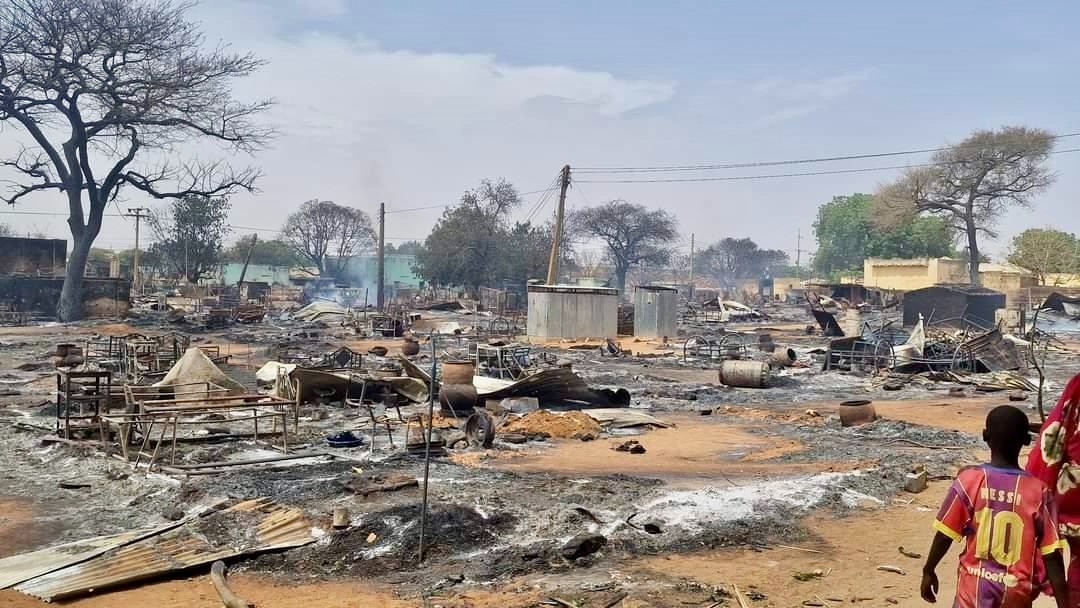The Sudan Conflict Observer – May 10 update
The SCO update is a rapid response to the expanding war in Sudan written through a peacebuilding, human rights and justice lens. Once a week, we try to capture the five most important stories in Sudan. Please share it widely.
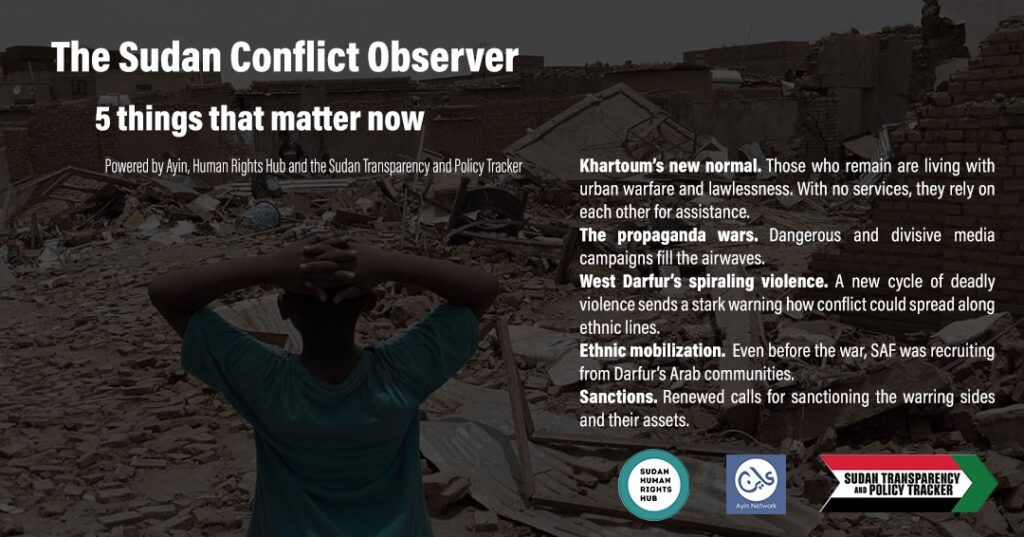
Powered by Ayin, Human Rights Hub and the Sudan Transparency and Policy Tracker
- Khartoum’s new normal. Residents are living with urban warfare and lawlessness. With no services, they rely on each other for assistance.
- The propaganda wars. Hostile and divisive media campaigns fill the airwaves.
- West Darfur’s spiraling violence. A new cycle of deadly violence sends a stark warning how conflict could spread along ethnic lines.
- Ethnic recruitment in Darfur. Even before the war, both sides were recruiting from Darfur’s Arab communities.
- International responses: sanctions and negotiations. As international mediators push parties to negotiate, experts call for sanctioning the warring sides and their assets.
Ayin reporters spoke with citizens in Omdurman, Al Thawra area who had their lives forever changed by the continuous armed fight between the militias.
Khartoum’s new normal: urban warfare, roving gangs, no services, and mutual aid
For residents in Khartoum and its suburbs, the “new-normal” is the sound of explosions and shooting, lawlessness, looting, occupation of schools and homes and hospitals. The healthcare system has been destroyed; responders in Khartoum are in dire need of supplies and pregnant women are forced to deliver at home in dangerous conditions.
Despite repeated ceasefires, fighting has continued for the last three weeks with devastating effects on the city and civilian life. SAF intensified air strikes at the end of April, focusing on the presidential palace and military HQ, but also hospitals and civilian structures held by the RSF. The RSF continued to raid homes, occupy neighborhoods, schools and hospitals, and have set up checkpoints and roadblocks in the city. SAF has mobilized the Central Reserve Police and Islamist militias in Khartoum, but this has not substantially changed areas of control.
Independent monitoring and investigation is crucial to assess the alleged human rights and humanitarian law violations. Both sides are using explosives in populated areas contrary to the laws of war, and a litany of other human rights violations such as widespread looting, occupying people’s homes, destruction of property, assaults, rapes and killings.
The Central Reserve Police, an auxiliary force that was sanctioned by the US for human rights violations in 2022, was officially announced to have joined the fight alongside SAF on May 4, although they had been observed supporting since the start of the fighting.
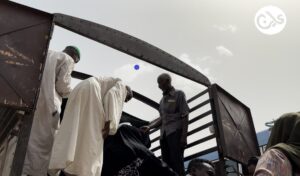
Residents continue to leave their homes in Khartoum and elsewhere. As of May 6, the UN estimated over 120,000 had fled the country – enduring long waits at border crossings or in Port Sudan, now a hub for evacuations – and about 334,000 had left their homes for safer locations, putting pressure on host communities to provide basic shelter and supplies. The UN refugee agency said it is preparing for a possible influx of 800,000 to neighboring countries.
Yet the vast majority have stayed behind. Local assistance efforts are ongoing. The Sudan Doctors Trade Union and networks of medical professionals are collaborating to keep as much medical service as possible available. Organizations of water and electrical workers are trying to restore access to services. Resistance committees are supporting the work of these networks and providing their own mutual assistance schemes. However, this work is extremely dangerous as neither SAF or RSF are facilitating passage and critical supply lines remain cut off. In addition to the general violence, we have evidence that frontline responders are being specifically targeted. Medical workers have been kidnapped and killed and in one case, SAF arrested ambulance drivers claiming that they worked for RSF.
Because of the security situation, traditional aid agencies and the UN are unable to do assessments or access areas that need help the most. This leaves citizens to take care of each other. Diaspora efforts provide support, but local first responders are facing enormous risks and inability to access goods and are not able to operate at the scale that is needed. As the weeks drag on it will be imperative for the humanitarian agencies to find ways to empower and work with these community efforts. So far, operations in Khartoum remain shut down although some efforts continue elsewhere in the country.
Sudanese Islamic Scholar Dr. AbdulHay Yousif: Fighting the RSF Militia Is Considered Jihad; RSF Leader Hemeti, Politicians “Fanning the Flames of War” Should Be Killed #Sudan #SudanCrisis pic.twitter.com/t6Bk0tOLBY
— MEMRI (@MEMRIReports) May 2, 2023
The propaganda wars
In addition to bullets and shells, Sudanese are facing a barrage of propaganda. The warring parties, as well as Islamists aligned with former President Omar al Bashir, have been inundating social media with messaging intended to polarize Sudanese and draw them to one side or the other of the conflict. The mix of dis-information, mis-information and propaganda make it increasingly difficult for many citizens to understand the situation.
Both SAF and RSF are active on social media, with 1.4 million and 988,000 followers respectively. It is unclear the audience size for Islamists accounts aligned with SAF and the NCP, but they are extremely active.
While the army continues to project itself online as the guarantors of stability, the RSF depicts itself as the defender of democracy and civilian rule, and claims to be fighting against an Islamist clique they say hijacked the SAF command. The RSF claims that they are the more trustworthy party by filming their forces in locations they claim to control –at times, even featuring live streaming of battles. The RSF made two civilian advisors available for live interviews in the coverage of events by Arab language satellite TV channels. They echoed the same talking points in these interviews, consistently claiming to care for the people.
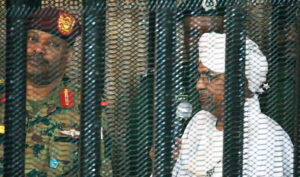
Islamists aligned with the former president, members of the Muslim Brotherhood, some Imams, and Jihadist organizations, have also increased propaganda. They are using a coordinated social media script to incite hatred and sow divisions. In propaganda speeches circulating on Facebook and other platforms, they claim that the Forces for Freedom and Change (FFC) asked the RSF to attack the army and say the RSF started the war so that civilians could take power. They also call on the military to let jihadist groups join the fight and passionately oppose the army’s talks with the RSF, arguing that more blood is required to reform this state. Some have also alleged Al Burhan helped the RSF gain strength and blame him for weakening the army. This anti-Burhan rhetoric appears to reflect a rift within the SAF leadership.
The National Congress Party, which was officially banned in November 2019, but informally reinstated after the October 2021 coup, has effectively endorsed these messages by calling on followers to also follow a list of “trusted sources,” who say the same things. This points to their role behind a coordinated campaign of threats and hate speech, many of which appear to be based out of Turkey.
Some Islamist figures have issued death threats. One scholar, Abdelhay Yousif, said on the Arabic language Channel 9 in Turkey that the fight against RSF is a jihad and its leaders and politicians should be killed. Yousif is alleged to have issued a fatwa during the peak of the mass protests in 2018-2019 authorizing the Bashir regime to kill up to one third of the nation to save the other two thirds under their rule. Others, including security chief Salah Gosh in an audio recording, have issued threats on social media against individual members of the civilian leadership.
Meanwhile, supporters of both warring parties and Islamist figures have criticized the “no to war” campaign, attacking those who try to maintain a neutral stance as either duped by politicians or as traitors. These messages raise the stakes for ordinary people, telling them that if they don’t pick a side they will be even more vulnerable.
Ayin: Geneina residents are now living in a shell of a town, with looted shops, empty government buildings, and the stark absence of any security forces to protect them (This article was originally published in the pan-African online magazine, The Continent)
West Darfur’s spiraling violence: a warning for Sudan
In Darfur, there has been both intense fighting and locally brokered peace initiatives. In all five Darfur states, local leaders have organized “good will committees” to mediate between the commanders of the SAF and RSF garrison with various degrees of success. These committees have brokered truces involving forces agreeing to confine themselves to their barracks and to leave the protection of civilians and public assets such as hospitals and NGO premises and commercial properties to the police force. Civilian committees were assigned to monitor these agreements.
The truces in Al Daein and El Fasher are holding. A truce signed on May 1 by about 12 tribal leaders in Al Geneina is fragile but holding. A similar agreement in Nyala was broken. These local peacekeeping initiatives could be a model for other locations across Sudan. However, that model will not go far in the capital, given its strategic and symbolic importance for both parties, and the political complexity of the national scene.
Meanwhile, the conflict in Al Geneina, West Darfur, and its surroundings sends a stark warning about the potential for ethnic fighting to spiral, especially when civilians take up arms. The situation in the city remains tense and uncertain, though relatively calm since the start of May, after major fighting that led to its near total destruction, causing tens of thousands of residents to flee. Those who remain are living in a shell of a town, with looted shops, empty buildings, burned offices and hospitals, armed men still roaming and no security forces to protect civilians. Some told us they were hiding and fear going out because of the prevalence of armed militia still in the streets and blocking movement.
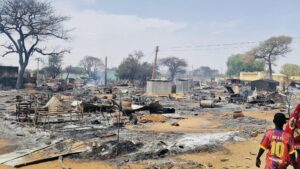
The fighting erupted on April 24 after an already-simmering conflict between Arab and Masalit communities escalated. Residents said that RSF-aligned Arab groups attacked mostly non-Arab internally displaced camps, burning the shelters to the ground and then targeting other areas. Outmanned and ill-equipped, police called on civilians to arm themselves, according to Ayin’s report. A number of weapons were reported to have been handed out or looted from police stockpiles, and a police chief was killed by unknown gunmen in the aftermath. The arming of civilians from both warring parties may trigger a dangerous precedent, residents said, and a deadly extension to the conflict.
As Arab militias and Masalit community groups fought, government security forces and the RSF reportedly retreated leaving a security vacuum. The violence has destroyed IDP homes, government buildings, markets, and brought life-saving medical services to a halt. Up to 200 people were killed, according to local doctors’ groups and tens of thousands have fled, some to Chad despite barricades deployed on the roads. Those remaining report they fear venturing out among armed men, and are unable to access health or other services.
Al Geneina and its surroundings have been wracked by this cycle of violence since 2019 when the UNAMID peacekeeping mission withdrew under pressure from the Sudanese government and transitional authorities that assumed power after August 2019, despite many warnings from civil society organizations that the security vacuum would lead to atrocities. This cycle of violence shows what could happen elsewhere in Sudan as the war between SAF and RSF continues, and as lawlessness takes root in ethnically divided communities, and as civilians feel they must take up arms in order to defend themselves.
Fears of this type of extension of violence are only reinforced by the resumption of violence in Nyala on Saturday, breaking the precarious calm of the locally negotiated peace. There are fears that this fighting may mobilize local ethnic groups against one another, and tribal militias are reportedly massing in RSF controlled areas.
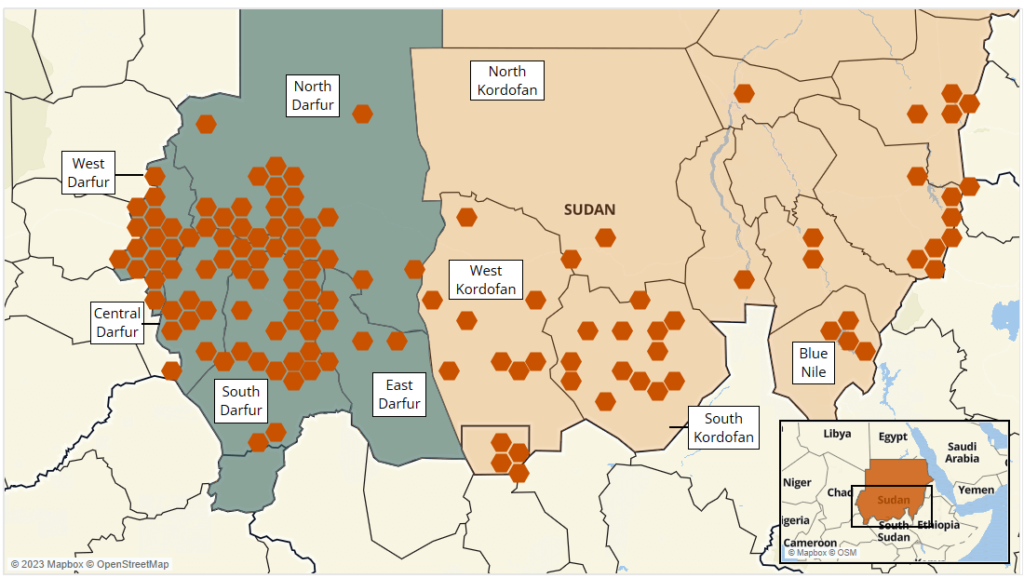 Ayin: Militia activity in Sudan (2022)
Ayin: Militia activity in Sudan (2022)
Ethnic recruitment in Darfur
It appears that the SAF and RSF were recruiting heavily in Darfur in the lead-up to the conflict that erupted on 15 April, including from Arab communities who had previously fought under Sheikh Musa Hilal in Darfur.
In the early 2000s, Hilal was a key government-backed militia leader who oversaw brutal counter-insurgency operations in Darfur. In later years, Hilal fell out with the government and formed his own movement. Meanwhile, al-Bashir had already begun to support Hemedti, a cousin and former protégé of Hilal from a different Rizeigat sub-group, to establish the Rapid Support Forces in 2013. In the following years, the RSF fought against Hilal’s forces, deepening the rivalry between the two men.
In 2017, Sudan’s former government brought Hilal and his supporters before a military court for allegedly attacking government forces and committing related crimes in Darfur. There were a range of concerns surrounding Hilal’s detention, including that authorities kept him in an unknown location for a period of time and denied him access to his lawyers. In 2021, Hilal was pardoned and released, reportedly pursuant to a tribal agreement between Hilal and Hemedti who at the time was the deputy chair of the transitional military council.
As tensions mounted between the SAF and the RSF in recent months, the SAF and related security agencies appear to have made a concerted effort to balance Hemedti’s power by recruiting among Musa Hilal’s clan. The RSF also reportedly sought to recruit among these same groups. There was, however, resistance to these moves in the community, where there was concern that this could lead to new tribal fighting. For example, the Rizeigat paramount chief, Mahmoud Madebo, denounced this recruitment campaign in March.
Although Musa Hilal himself remained silent on the recruitment drive, there are rumors that he was liaising with military intelligence in the run up to the outbreak of violence in April. Hilal has allegedly been tasked with speaking with RSF prisoners of war to encourage their defection to SAF ranks. It is unclear what may have been discussed, but it is possible that SAF is trying to get Hilal to fight against Hemedti.
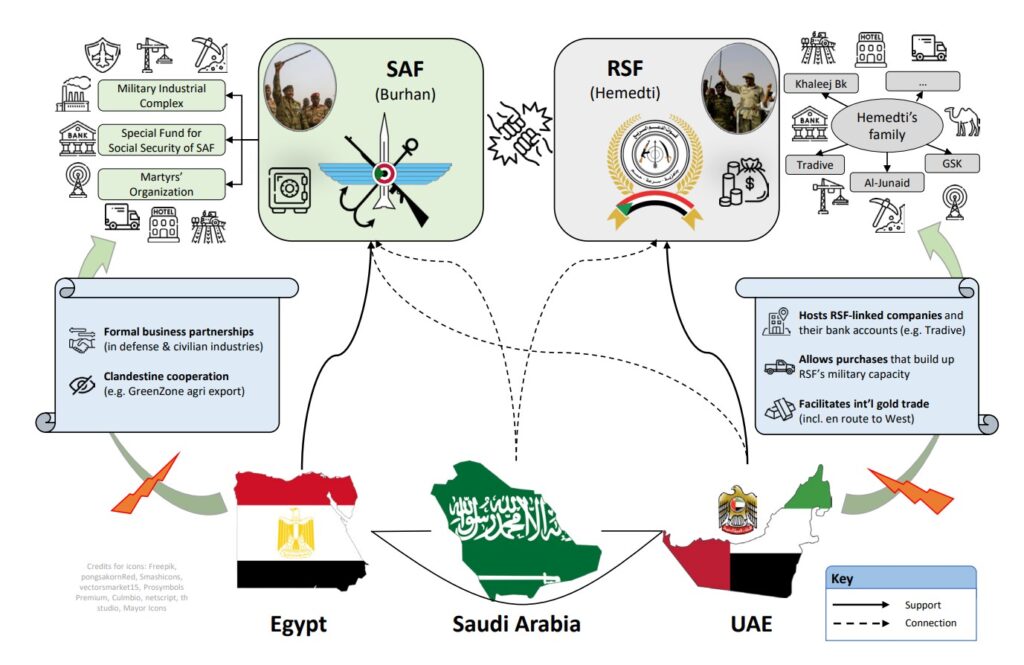
International responses: sanctions and negotiations
As the fighting in Sudan enters its fourth week, “pre-negotiations” are opening up in Jeddah. Neither party seems particularly inclined to make a deal, as fighting continues and the substance of the negotiations is limited to a ceasefire and the establishment of humanitarian corridors. International actors are seeking leverage to change these dynamics and some advocacy organizations and experts are calling on them to consider sanctions as a tool.
Sudan Policy and Transparency Tracker’s founder, Suliman Baldo, called for the US, EU and international actors to impose sanctions not just on the individual commanders but on their economic networks. Although many in Sudan oppose sanctions due to the inefficiency and negative consequences of previous rounds of sanctions, Baldo argues that sanctions that are narrowly targeted at the crown jewels of the corporate networks of the SAF and the private assets of the RSF commanders can be more successful and change the calculus of the warring parties. Similar arguments were put forward by Clingendael and Sudan scholar Aly Verjee as well.
A slightly different plan for imposition of sanctions was put forward by a former senior advisor to the US special envoy to Sudan and South Sudan who made a call for sanctions to first be imposed on the assets of the RSF, reserving the possibility of sanctions against the SAF should they refuse to hand over power to civilians as promised. This sequential approach is based on the argument that there is already an imbalance of power that can be accelerated to ensure a speedier close to the conflict, but risks appearing to favor one side.
On May 4, a US executive order imposed sanctions on individuals who destabilize Sudan and undermine its transition to democracy, but did not name anyone. It’s not clear when US authorities might name anyone, nor what their strategy will be if they do so. Whatever the strategy, it is clear that these are unlikely to be effective if efforts are not made both to promote consensus in the international community and to complement sanctions with other diplomatic and practical actions as part of a broader strategy.
More from our partner organizations:
SUDAN TRANSPARENCY AND POLICY TRACKER
Sign up to the Sudan Transparency and Policy Tracker newsletter here
- Sudan Conflict Monitor, Issue #2 May 2023
AYIN NETWORK 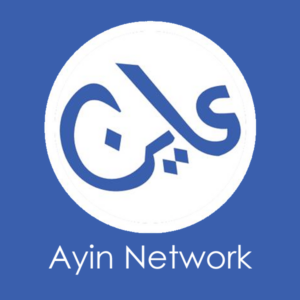
Follow Ayin: Youtube Facebook Twitter
- Geneina ransacked, shockwaves of the war 7 May 2023
- Under siege – conversations in Omdurman 3 May 2023
- Cyclical violence in West Darfur, Geneina ransacked 30 April 2023
- A truce for El-Fasher, a sigh of relief for doctors 24 April 2023


